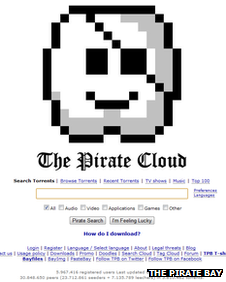The Pirate Bay moves to the cloud to avoid shutdown
- Published

The Pirate Bay says the move will make it harder to attack its site
File-sharing website The Pirate Bay has moved its servers to the cloud to frustrate attempts to take it offline.
The site, which has been blamed for encouraging illegal file-sharing, will now operate from cloud-hosting providers around the world.
It says the move will save money and make it harder for law-enforcement agencies to shut it down.
"All attempts to attack [us] from now on is an attack on everything and nothing," it says.
In 2006, police in Sweden raided The Pirate Bay, shutting down its servers and taking the site offline.
The Pirate Bay (TPB) now says its new cloud-based servers, which use the internet for storage, do not have to be hosted with the same provider, or even on the same continent - making it impervious to attempts to close it down.
Its statement continues: "The site that you're at will still be here, for as long as we want it to. Only in a higher form of being. A reality to us. A ghost to those who wish to harm us."
A TPB representative : "Moving to the cloud lets TPB move from country to country, crossing borders seamlessly without downtime.
"The hosting providers have no idea that they're hosting The Pirate Bay, and even in the event they found out it would be impossible for them to gather data on the users."
TPB says it will retain control of the technology - transit routers and load balancers - which allows it to distribute file-sharing requests across multiple computers, and also hide the identity of both the cloud-provider and its users.
The statement said: "If the police decide to raid us again there are no servers to take, just a transit router.
"If they follow the trail to the next country and find the load balancer, there is just a disk-less server there. In case they find out where the cloud provider is, all they can get are encrypted disk-images."
- Published17 August 2012
- Published8 March 2012